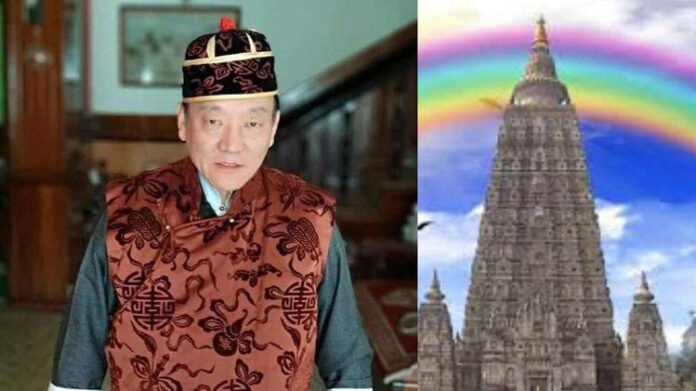Prominent Sikkimese tribal leader and socio-political activist Tseten Tashi Bhutia has extended his full support to the growing nationwide demand for complete Buddhist control over the Mahabodhi Temple in Bodh Gaya, Bihar. The revered temple, believed to be the sacred site where Lord Buddha attained enlightenment, has been at the heart of a long-standing debate regarding its administrative control.
Bhutia, who also serves as the convenor of the Sikkim Bhutia Lepcha Apex Committee (SIBLAC), participated in a solidarity rally organized in Gangtok to express support for Buddhist monks and activists campaigning for the restoration of the temple’s administration to the Buddhist community. The rally, attended by monks, scholars, students, and members of various Buddhist and tribal organizations, emphasized the significance of religious self-governance and cultural autonomy.
The current management of the Mahabodhi Temple is governed by the Bodh Gaya Temple Act of 1949, which stipulates the formation of a nine-member Bodhgaya Temple Management Committee (BTMC). Of these nine, only four are Buddhists, while the remaining five, including the chairman—typically the local District Magistrate—are non-Buddhists. This structure has led to mounting criticism from the Buddhist community, which argues that it undermines the very essence of the temple’s spiritual and historical importance.
Speaking at the event in Gangtok, Tseten Tashi Bhutia stated that the issue transcends religious lines and touches upon constitutional rights, cultural respect, and historical justice. “The Mahabodhi Temple is one of the holiest sites for Buddhists around the world. It is only fair and just that its management be entirely in the hands of the Buddhist community, as custodians of their own sacred heritage,” Bhutia remarked.
He also highlighted the broader implications of this demand, noting that Sikkim and other Himalayan states, which are home to vibrant Buddhist communities, stand in solidarity with their counterparts in Bihar and across India. “We see this not only as a Buddhist issue but also as a question of indigenous and minority rights. The communities that have safeguarded these traditions for centuries should have the autonomy to manage their sacred institutions,” he said.
The rally also featured speeches by Buddhist monks and cultural leaders who emphasized that the call for change is rooted in peaceful dialogue, constitutional appeal, and moral responsibility. There was a collective appeal to the Government of India to revisit and amend the Bodh Gaya Temple Act, allowing for the formation of a fully Buddhist management body.
This movement has been gaining traction beyond Bihar and Sikkim, with demonstrations, petitions, and awareness campaigns taking place in Maharashtra, West Bengal, Ladakh, and even international Buddhist forums. Protesters argue that similar religious sites in India are managed by members of their respective faiths, and the Mahabodhi Temple should be no exception.
For Sikkimese leaders like Bhutia, this is also a moment of unity among tribal and indigenous voices, affirming their shared cultural lineage with the Buddhist world. “This is about restoring dignity, ensuring representation, and honoring the legacy of the Buddha. It is a matter of spiritual sovereignty,” he concluded.
As momentum builds, the call for Buddhist control of the Mahabodhi Temple continues to echo across regions and communities, forming a movement that blends spirituality, heritage, and constitutional advocacy. The path ahead remains uncertain, but the voices calling for change grow stronger with each passing day.

